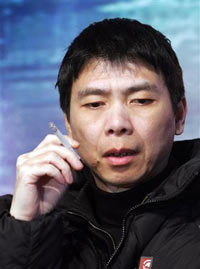Chinese films have become hot tickets around the world, but few movie-goers
outside China have even heard of the country's arguably most popular, or at
least most populist, director.

Chinese film director
Feng Xiaogang attends a news conference for his latest film 'The Banquet'
in Anji county, east China's Zhejiang province, in this November 23, 2005
file picture. [Newsphoto] |
Feng Xiaogang, 48, has
been one of China's most beloved, bankable movie names for almost a decade by
honing in on native tastes, while internationally celebrated directors like
Zhang Yimou and Chen Kaige have faced criticism at home for pandering to Western
audiences and awards committees.
"I think it's most important to get Chinese audiences' approval. If you can't
be accepted by your own people, it's hard to get others' respect," Feng told
Reuters.
"The Banquet," Feng's newest project, represents his most serious shot at
overseas markets, especially since he has cast Zhang Ziyi, China's hottest star,
in the leading role.
"She has a lot of influence in Asia and around the world. I think if this
move gets good worldwide distribution, she'll have a lot to do with it," he
said.
With its elaborate period costumes, palatial sets and occasional bursts of
action, the historical drama, set during China's tumultuous Five Dynasties
period (907-960 A.D.), represents a major shift for Feng.
The director, a thin man with a signature mouth full of crooked teeth and the
gravely voice of a heavy smoker, first won fame through light, overtly
commercial contemporary comedies that debuted in time for Chinese Lunar New
Year.
He reigned as king of the Chinese box office until Zhang Yimou shed his
art-house reputation with the 2002 blockbuster "Hero," which became the China's
highest grossing film and raked in over $50 million and an Oscar nomination in
the United States.
The overseas market has proven less kind to Feng.
LESSONS
In 2001, he collaborated with Columbia Pictures' Asian division to make the
dark comedy "Big Shot's Funeral," in which veteran film icon Donald Sutherland
played a film director believed to have died in Beijing, where his funeral
becomes an advertising and media feeding frenzy.
The film's jabs at the social changes that have swept China since it embraced
market reforms over two decades ago tickled domestic audiences, but went over
heads when it debuted on small release in Europe and the United States in 2002
and 2003.
"Some Westerners said they didn't really understand it. In reality, I think
they didn't get it because of a feeling of cultural superiority," Feng said.
"I don't believe Westerners don't understand that kind of humor, they didn't
want to understand."
The lessons of "Big Shot's Funeral" informed Feng's decision to make "The
Banquet," due to debut in China in September.
"It seems like Western audiences have an easier time accepting Asian stories
set in ancient times. That's a reality. I don't think it's a good thing, but for
me, I wanted to make that kind of change."
The genre shift, calculated or not, has already paid off. Japan's Gaga
Distribution has paid $5 million for distribution rights to "The Banquet" and
producers Huayi Brothers, China's biggest private film maker, has said it will
promote the film for Oscar contention.
But Feng says regardless of style change or international interest, he will
not change his basic focus on the masses.
"You can go from a comedy to a tragedy, but it shouldn't affect if a movie is
good or not. I won't go and make an empty film that leaves people wondering what
it meant after they see it. Like in my previous movies, my aim is to knock my
audiences down," Feng said.
"I think the relationship between a director and the audience is like a
boxing match. Either you knock them out or they'll pummel you."
